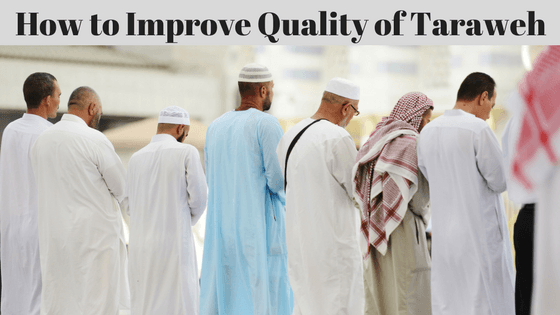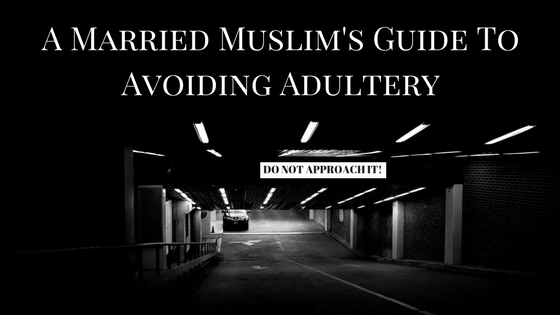7 ways to improve the quality of your Taraweh
In our previous Ramadan article, we discussed how to set realistic goals for Ramadan. Today, I want to share with you a few tips on how to improve the quality of your Taraweh Salah.
For too many of us, Taraweh has become a ritual that we just try to get through. A lack of concentration and understanding, combined with rushed prayer lead many to have an unfulfilling experience. However, there are many people who really benefit from the night prayer in Ramadan.
These Muslim experience higher levels of spirituality, closeness to Allah, and a deeper connection with the Quran.
How do they do it?
I have summarized this in seven simple tips that any of us can implement this Ramadan. Applying even one of these seven strategies will help you improve the quality of your Qiyam Al-Layl this Ramadan.
1. Renew Your Intention Daily
Any act of worship can become a ritual if we do not check our intentions daily. So the first step to keeping Taraweh relevant is to remind yourself everyday why you are praying it. Remind yourself every single day on the way to the Masjid: “I am praying Taraweh for the sake of Allah to improve my relationship with Allah and His Book.”
A daily reminder about why we pray goes a long way in helping us pray properly.
2. Choose the right Masjid
In some Masjids, the Imams treat Taraweh as a ritual to rush and complete in record time. As a result, the Quran is rushed through, Salah is prayed too fast to be considered acceptable, and nobody really benefits.
But there also exist Masjids in which Taraweh is treated with respect. The Imam recites with proper Tajweed, at a moderate pace, and still completes in a decent time. Choose these masjids over the former for a better experience.
Last resort, if you can’t find a Masjid where they pray properly then consider praying at home alone, or with family and friends. It is better than rushing through the prayer at super-speed.
3. Read the translation
Before heading to the Masjid for Taraweh, browse through the translation of some of the verses that the Imam will be reciting that day. This will help you concentrate better in the Salah and get more benefit from the Salah. Read the translation of key passages before Salah and reflect on them during the prayer, instead of daydreaming.
4. Study The Tafseer
Attend a local Tafseer class, follow an online Tafseer series, join our free online course, or read a Tafseer book. Make an effort daily to understand the Quran a little deeper. This will make the Taraweh experience more beneficial.
Be careful though! Make sure you are studying an authentic Tafseer, and not a misguided Tafseer or even worse: making up your own understanding of the Quran. To be safe, stick to the work of authentic scholars.
5. Pray in the last one third of the night
Depending on which school of thought you follow, Taraweh and Tahajjud are the same thing i.e. they are both Qiyam Al-Layl prayed during Ramadan. Therefore, the best time to pray it is not immediately after Esha, but during the last one third of the night.
This is the time when duas are answered, giving you more reason to pray at that time. There are many ways to work this into your Ramadan. You could pray the entire Taraweh late at night, or leave a few Rakah for late at night. Or even just leave the Witr for Suhoor time. Whichever route you choose, try to pray a few Rakah during the one third of the night for a deeper spiritual experience.
6. Make dua during the last one third of the night
As mentioned in the previous point, duas are answered during the last one third of the night. So you don’t just want to pray at that time, you want to pour your heart out to Allah at that time. Too many of us wake up groggy for Suhoor and sleepwalk through the meal. Instead, utilize that time to make dua for the things you really want. This will lead to a deeper spiritual experience.
7. Avoid Negativity
Focus on your Ibaadah and relationship with Allah this Ramadan.
Avoid negative thoughts: I’m not good enough to pray!
Stay away from controversial discussions: How many Rakah is Taraweh, anyway?
Keep a distance from bad company: What’s a sinner like you doing praying?
And avoid arguing with your fellow Muslims.
Focus on your relationship with Allah. That is all that matters. Taraweh is not a competition between you and your friends on who is going to pray more, finish faster, or who has the stronger Daleel. It is an act of worship that must be done for the sake of Allah.
Do these seven things and you will, in shaa Allah, experience a more spiritual Taraweh this Ramadan!
To help you improve your understanding of the Quran this Ramadan, get a copy of our exclusive eBook ‘Themes of the Quran‘.

 What is the Fitrah?
What is the Fitrah?




